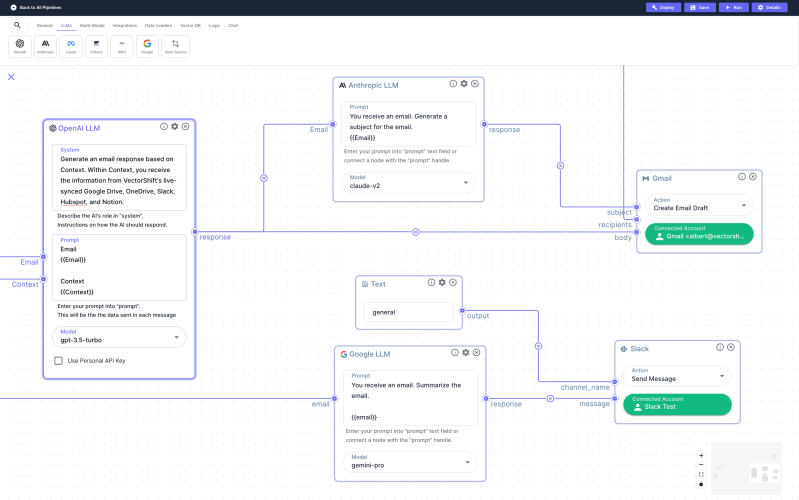Today, VectorShift, a startup working to simplify large language model (LLM) application development with a modular no-code approach, announced it has raised $3 million in seed funding from 1984 Ventures, Defy.vc, Formus Capital and Y Combinator.
The New York-based startup was founded by Harvard alumni Alex Leonardi and Albert Mao. VectorShift provides enterprises with an end-to-end AI platform, where users can simply drag and drop components to build, deploy and maintain production-grade LLM workflows, search engines, assistants and automations.
The offering is being used by enterprises across sectors and has the potential to handle and automate a large chunk of daily business processes, saving teams’ time and effort to focus on higher-order tasks. It comes at a time when companies are going all in to loop language models into their internal and external applications with the ultimate goal of driving efficiencies and improving ROI.
What does VectorShift bring to the table?
Today, building a robust LLM application or LLM-based automations requires working on multiple technical aspects, right from selecting the data and model for fine-tuning to customization and prototyping. Each layer in this pipeline requires a significant amount of work – something that Leonardi and Mao saw in their previous roles at Blackstone and McKinsey where they evaluated how organizations could augment repeatable processes with AI.
VB Event
The AI Impact Tour – NYC
We’ll be in New York on February 29 in partnership with Microsoft to discuss how to balance risks and rewards of AI applications. Request an invite to the exclusive event below.
“Having worked closely with enterprises at the strategic level, Albert and I saw the hurdles in adopting new technologies and the complexity associated with building robust, integrated AI systems,” Leonardi said in a statement. These experiences drove them to build VectorShift, an end-to-end platform deploying AI applications.
At the core, the platform modularizes the core parts of deploying any LLM application through no-code and software development kits (SDK) interfaces. Users can easily connect their tools and databases to the platform, import data from them to the vector store and use the drag-and-drop interface to build a pipeline defining how that data will work with a language model of choice (from GPT series to Mistral) to deliver the desired AI application.
The library of components in the interface allows teams to build and rapidly iterate on the targeted application’s architecture. There’s also the option to choose from pre-built application templates to get quickly started and then customize them with data and the drag-and-drop builder. Once the architecture and the look and feel of the app are finalized, it can be exported for deployment to end users.

According to VectorShift, the no-code approach it uses to bring together data, tools and LLMs can help with a range of applications, including enhancing internal products with AI-based search, which can allow teams to retrieve information from document apps like Notion through natural language queries. In another case, it can help automate trigger-based actions across applications, like sending a personalized email generated by GPT-4 in response to a specific query.
On the application front, the offering can also help teams prototype and deploy chatbots targeted at customer support, onboarding flow, lead collection and white-glove advisory. It can even be used to build report generators or resume screeners, the company said.
Good initial traction
While VectorShift has not disclosed how many companies are using its technology, the company did confirm to VentureBeat that its client base comes from different sectors and that they have tapped its tech to automate internal processes and build entire generative AI products.
A European conglomerate, for instance, is using VectorShift to automate report writing for its clients, while a professional services firm working with the U.S. government has deployed the platform to automate sales proposals and search through their contract library. Similarly, a healthcare education company is using the tech to maintain a chatbot that answers patient questions leveraging their extensive knowledge base.
However, it is important to note that the company is not alone in this space. Several other startups, including some well-funded ones like LangChain, Vectara and Datasaur, are offering toolkits to accelerate and streamline the development of gen AI-powered applications. Most recently, Bret Taylor, who is the director of the board at OpenAI, announced his own startup ‘Sierra’ to help enterprises build always-available AI agents for their respective businesses.
“There are other tools (helping with AI app development), but our main differentiation is the flexibility and readiness for enterprise use cases. Beyond our no-code builder, we support the ability to automatically embed thousands of files in vector databases (AI-powered storage) and keep them synced with changes, and we allow AI workflows to run automatically by connecting with relevant integrations (e.g., email providers, CRMs). We also have a framework for quickly evaluating workflows and a fully featured Python SDK, allowing developers to interface with the platform through code,” Leonardi told VentureBeat.
As a next-step, the company plans to use the seed round to build on its work and make VectorShift the go-to all-in-one platform to build and deploy production-level LLM workflows, agents, and automations. The goal is to ride on the growing demand for LLM-based apps, which are now seen as the driving force of modern businesses.
“Many enterprises can benefit from developing LLM-based products, and the VectorShift platform allows companies to efficiently realize this value,” Bob Rosin, partner at Defy.vc, said.
According to data from McKinsey, generative AI has the potential to generate value equivalent to $2.6 trillion to $4.4 trillion in global corporate profits on an annual basis. The organization has identified as many as 63 use cases in which generative AI can raise productivity, including providing support interactions, generating creative content for marketing and sales and drafting software code based on natural-language prompts.
VentureBeat’s mission is to be a digital town square for technical decision-makers to gain knowledge about transformative enterprise technology and transact. Discover our Briefings.

